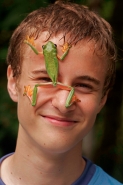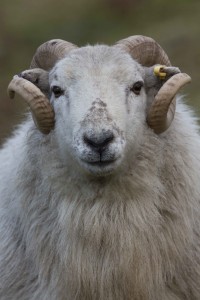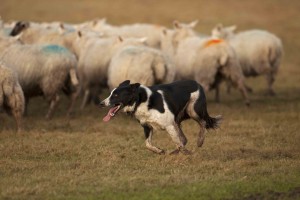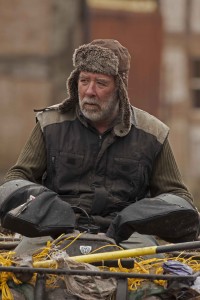Blog
I recently found myself in rural Herefordshire in western England during the wettest period in recorded history. In order to justify my existence, I undertook a photographic project documenting local farm life. I saw more than my share of sheep, rain, mud, and friendly farmers. I was enthralled by the way the ubiquitous border collies work the sheep. They are smart and incredibly enthusiastic. They obviously love their work. Sadly, it is said that the kind of small family farms that I visited are endangered by the trend toward big agribusiness.
In the evenings, the farmers tended to congregate at the local pub, the Kings head, which was the center of social life in these parts. The farmers that I befriended imbibed copious quantities of the local malted beverage, beer that is. Even though my companions drank considerably, they considered themselves lesser men than the man who used to frequent the pub who could drink 18 pints of beer, get up at four the next morning, work all day and come back and repeat the process the following day. About this time I began to feel somewhat judgmental about the glorification of alcohol abuse. One evening there was a new face amongst the regulars. He was somewhat disheveled and teetering around on his stool spilling beer on himself. This is the price one pays for alcoholism I might have self righteously thought. Then came the lesson. The man, called Ivor, has Parkinson’s disease. In spite of this he still runs a successful farm, which among other things is home to a legendary racehorse ranked as one of the top 10 mares of the 20th century! He is also a sportsman and former athlete and, as mentioned earlier, still makes the effort to come to the pub to share time with his mates. Another data point for the don’t judge a book by its cover axiom! By the way, the evening at the pub when I met Ivor, I had humble pie for dessert.
Rumble in the Jungle: Costa Rican Soccer Donation
Note: Below are experiences that I had with my son Nick in Costa Rica in July of 2011,
 These people redefine poverty in the American materialistic sense. Yet like Latin American “campesinos” of all races, they are willing to share what little they have. They pay no taxes, they grow or harvest most of their own food including the best “bananas” that I’ve ever tasted. We spent a day with one of the “caciques” of the group at his remote house, with no doors, windows, screens or beds. We got caught in a torrential rain during our visit, it was the rainy season in the rainforest, after all. The Ngobe live with their extended families. We met one man who was reputedly 130 years old, who spoke no Spanish and sang us a song about rain, lightning, birds and the sea. No nursing home for him, he lived with his wife and what was left of his family, most of which he had outlived.
These people redefine poverty in the American materialistic sense. Yet like Latin American “campesinos” of all races, they are willing to share what little they have. They pay no taxes, they grow or harvest most of their own food including the best “bananas” that I’ve ever tasted. We spent a day with one of the “caciques” of the group at his remote house, with no doors, windows, screens or beds. We got caught in a torrential rain during our visit, it was the rainy season in the rainforest, after all. The Ngobe live with their extended families. We met one man who was reputedly 130 years old, who spoke no Spanish and sang us a song about rain, lightning, birds and the sea. No nursing home for him, he lived with his wife and what was left of his family, most of which he had outlived.
Still there were things we had in common: mobile phones and a love for football, and they are surprisingly good at it. What we had to offer them was in my mind rather meager, mostly old equipment cast off by our more privileged children : balls ,uniforms, and shin guards. I suggest you be careful when you order “tacos” in Costa Rica because that is what they called the cleats we brought for them. Still our offerings far outstripped the moribund ball and tattered “equipo” which I saw upon our arrival, and the donations were much appreciated by the people of the village.
Part of our mission was to promote the idea of ecotourism, wildlife conservation and pride in their culture, so we brought with us a person from the nearby private wildlife sanctuary who spoke about possible future collaborations.
With all of these noble ideas aside, the game began and, as predicted, the foreigner,(my son), a child from the nearby ranch and the locals came together instantly, in a way only the melting pot of football can allow. It was a rousing game for the younger kids, 10-17 years old. A great comeback where my own son scored the tying and winning goals. What fun indeed. I hope to bring more equipment to this village as they hope to enter the national scholastic championships next year.
It was a memorable time with the only downside being the multitude of chiggers we picked up on the field, the bites appearing the following day. It was more than worth the price for this unlikely meeting of two cultures, different in so many ways, and yet so much on the same wavelength when it comes to the “beautiful game”.
Soccer and conservation in South Africa
Soccer—A Kick for Conservation and Communities
Article and Photos by John Cancalosi
What do wildlife photography, soccer, and conservation have in common? I shall attempt to make the connection clear.
It was wildlife photography that took me—a person who does this sort of thing for a living—to a private game reserve in Zimbabwe some years ago. It was a passion for soccer that found me playing the game with staff working at the reserve.
The love of soccer created an instant bond among us. We played on the scorched earth under the searing midday sun, using a well-worn ball “inflated” with crumpled newspapers. Wondering how proper equipment might affect our scrimmages, I purchased a new ball. Its delivery to a nearby village was cause for celebration. The whole village—200 or so—turned out to watch the ball’s inaugural soccer game, and a great time was had by all. The cost of that ball was the best money I had ever spent.
Several years later, while in South Africa, it occurred to me that the love of soccer might be used to create goodwill between nature parks and the villages that surround them. With this in mind, I arranged to meet Brad Poole of Ezemvelo KZN Wildlife (KZN), the provincial wildlife authority in KwaZulu-Natal (Zulu Kingdom).
Brad shared my passions for soccer and for wildlife conservation, and after some discussion, we formed a partnership to develop a pilot project—Get the Ball Rolling—to donate books, soccer balls, and other sporting equipment to villages in the Ukhahlamba-Drakensberg region.
I arranged for the donations, and Brad organized their distribution. Contributions were generous. The English Football Association donated several dozen balls and T-shirts, and British Airways, a mountain of sportswear and other clothing. Biblionef South Africa contributed hundreds of children’s books written in the Zulu language, and South African Airways offered a significantly reduced cost for shipping the donations to South Africa.
Many of the donations were delivered to the mayor of a region near Pietermaritzburg, a man named Sipho Bhengu, with whom I developed a friendship. Mayor Bhengu was curious about what I did for a living, so I asked if he would like to accompany me to a blind I had set up to photograph endangered wattled cranes. As we traveled to the crane site, we were followed by two armed guards—the mayor also carried a weapon. As it became apparent the situation was safe, the guards left, and I was afforded a rare opportunity to spend a day birdwatching and photographing wildlife with Mayor Bhengu. Our conversation dwelled on natural history and conservation.
Later, I visited a number of schools in the Pietermaritzburg area with KZN’s Community Liaison Officer Dennis Mkhabela. I observed thousands of children studying under conditions that would try the souls of lesser humans. Their teachers were grateful to receive the educational materials and sports equipment we brought to them. The bulk of the partnership’s donations, however, were presented at a soccer tournament held in a stadium sitting in the shadow of the Ukhahlamba-Drakensberg Mountains.
During the tournament, a match was played between a team of villagers and a team of KZN employees. I don’t remember who won—it didn’t matter. A win-win atmosphere had enveloped the local residents and park workers. Following the game, the park staff and I were invited to dinner at the local Zulu chief’s office. The KZN staff told me that this was the first time they had ever received such an invitation from the village. It was gratifying to think that I might have contributed in some small way to fostering goodwill between them.
This experience leads me to urge those working for wildlife in rural Africa, or elsewhere in the soccer-loving world, to consider the connections that can be forged between communities and conservationists simply through a shared passion for soccer, the “beautiful game.”
Another Luddite Bites the Dust!
After years of prideful devotion to the outdoor life and the desire to be “different”, (in other words procrastination), I now submit to the inexorable peer pressure to establish my own self-directed web presence. I therefore now exist or cease to exist depending on your perspective. There now, that wasn’t so bad was it?



